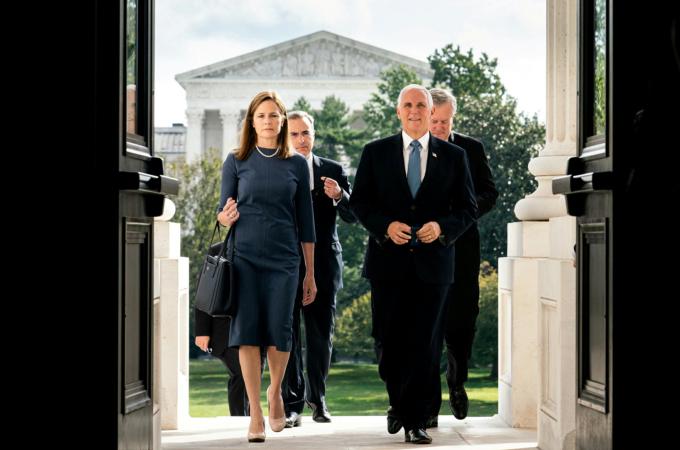The Court confirmation deal
When did confirming someone for a seat on the Supreme Court become a traumatic ordeal for the candidate and the nation? How did we get to the point where a nominee's intelligence, character, and experience no longer suffice? Once again, these questions have forced themselves on the country's attention in the confirmation process of Judge Amy Coney Barrett for the opening created by the death of Justice Ruth Bader Ginsburg.
Now, too, the novel coronavirus has added further uncertainty to the process, with several senators developing COVID-19. But the problematic nature of Supreme Court confirmation was a reality long before the virus came along.
It's usually said that the bad times began in 1987 with President Ronald Reagan's nomination of Robert Bork. Bork, a conservative legal scholar and federal judge, former U.S. Solicitor General, and former Acting Attorney General, was greeted with a ferocious mix of loathing and alarm by Senate liberals who determined to go all-out to defeat him.
Out front in the anti-Bork charge was Sen. Edward Kennedy (D-MA), who famously said on the Senate floor that Bork's America was, among other things, a place where "women would be forced into back-alley abortions" and "blacks would sit at segregated lunch counters." Bork, a reserved man who later converted to Catholicism, said simply, "There was not a line of that speech that was accurate."
The Senate Judiciary Committee, chaired at the time by Sen. Joseph Biden (D-DE), sent Bork's nomination to the full Senate with the recommendation that it be defeated, and the Senate obliged, voting 58-42 to reject Bork.
Now the unhappy consequences of that disgraceful episode are visible again in the case of Judge Barrett. And here it's become apparent that the real start of the confirmation problem came earlier and lies even deeper than the Bork affair. To be precise, the origin of this ongoing stain on the confirmation process and much else in our national life was the Supreme Court's January 22, 1973 Roe v. Wade decision legalizing abortion.
Roe did many things, most of them bad. In the present context, it can rightly be seen as having placed a question that does not admit of any compromise at the center of an ongoing, notably rancorous national debate. What question is that? Just this: Is it right or is it wrong deliberately to take the life of a nascent human being?
A seven-member majority in Roe v. Wade unaccountably said it was right, in the process shouldering aside legal precedent and practicing what Justice Byron White, who with Justice William Rehnquist was one of the two dissenters, called "an exercise of raw judicial power." Millions of Americans then and since have rightly rejected -- and today continue to reject -- the ill-considered embrace of abortion by those seven justices.
It would be a mistake, too, to blame the present situation on the recalcitrance of prolifers. On the other side of this debate, pro-choice people have turned acceptance of Roe into a litmus test of loyalty to their cherished ideal of moral libertarianism, a vision summed up and celebrated in the magical word "choice" that has come to be applied to other issues besides abortion in our never-ending culture war.
Here's hoping Judge Barrett, an eminently qualified jurist, makes it onto the Supreme Court, despite efforts to apply an illegitimate religious test to her nomination. And here's hoping, too, that before much longer that court will acknowledge the destructive folly of Roe and take responsible steps to repair the damage it has done.
- Russell Shaw is the author of more than twenty books. He is a consultor of the Pontifical Council for Social Communications and served as communications director for the U.S. Bishops.



















